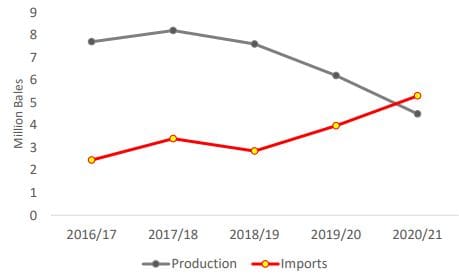PAKISTAN’s 2020/21 cotton imports are forecast at a record 5.3 million bales and are expected to exceed domestic production for the first time, according to the latest report from the United States Department of Agriculture (USDA).
Significantly lower domestic supplies have driven imports to a second consecutive record needed to support higher consumption.
Consecutive year shortfalls in domestic production have depleted supplies significantly.
The 2019/20 Pakistan harvest was the lowest in over three decades, and the 2020/21 crop is down 27 per cent.
Back-to-back declines have propelled imports, mostly supplied by Brazil and the United States.

Figure 1: Pakistan cotton production, imports.
Historically, India was a significant supplier to Pakistan. However, after a 2019 border closure between the two countries, Pakistan’s mills have been barred from importing the world’s lowest-priced cotton.
With India as the world’s largest cotton yarn exporter, Pakistan’s cotton importers and Yarn Merchants Association have requested that the government allow trade.
On March 31, the Economic Coordination Committee of the Cabinet proposed permitting imports of cotton lint and yarn from India; however, the proposal was rejected by Pakistan’s cabinet the following day.
Despite no official direct access to India’s competitively priced supplies, imports are nonetheless projected at a record to support a recovering textile and garment sector.
COVID-19 significantly lowered global demand for cotton yarn, fabric, and products in 2019/20. In the first 8 months of Pakistan’s fiscal year (July 2020 – February 2021), the country recorded larger export values of knitwear, bedwear, towels, and readymade garment (RMG) compared with the previous year
Pakistan’s stronger exports of textiles and garments are expected to support record 2020/21 cotton imports.
The country’s cotton supply chain is essential to its economic recovery from COVID-19; textiles and garments are not only the largest source of export revenue but also comprise 46pc of Pakistan’s manufacturing sector and 40pc of the total labour force.
Source: USDA



HAVE YOUR SAY